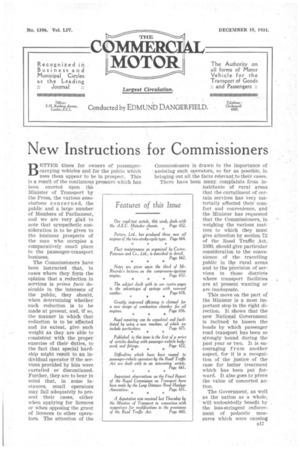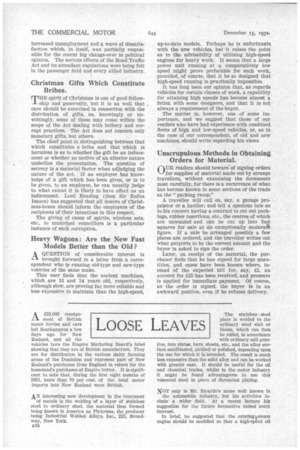New Instructions for Commissioners
Page 35

Page 36

If you've noticed an error in this article please click here to report it so we can fix it.
BETTER times for owners of passengercarrying vehicles and for the public which uses them appear to be in prospect. This is a result of the continuous pressure which has been exerted Upon the Minister of Transport by the Press, the various associations concerned, the public and a large number of Members of Parliament, and we are very glad to note that sympathetic consideration is to be given to the business . prospects of the man who occupies a comparatively small place in the passenger-transport business.
The Commissioners have been instructed that, in cases where they form the opinion that a reduction In services is prima facie desirable in the interests of the public, they should, when determining whether such reduction is to be made at present, and, if so, the manner in which that reduction is to be effected and its extent, give such weight as they are able to consistent with the proper exercise of their duties, to the fact that special hardship might result to an individual operator if the services provided by him were curtailed or discontinued. Further, they are to bear in mind that, in some instances, small operators may fail adequately to present their cases, either when applying for licences or when opposing the grant of licences to other operators. The attention of the Commissioners is drawn to the importance of assisting such operators, so far as, possible, in bringing out all the facts relevantto their cases. There have been many complaints from inhabitants of rural areas that the curtailment of cer tam n services has very materially affected their comfort and convenience, and the Minister has requested that the Commissioners, in weighing the various ,mat-: ters to which they must give attention by section 72 of the Road Traffic Act, 1930, should give particular consideration to the convenience of the travelling public in the rural areas and to the provision of services in those districts where transport facilities are at present wanting or are inadequate.
This move on the part of the Minister is a most important step in the right direction. It shows that the new National Government is inclined to loosen the bonds by which passenger road transport has been so strongly bound during the past year or two. It is encouraging from another aspect, for it is a recognition of the justice of the case for better treatment which has been put forward. It also goes to-pfove the value of concerted acti on.
The Government, as well as the nation as a whole, will undoubtedly benefit by the less-stringent enforcement of pedantic measures which were causing increased unemployment and a wave of dissatisfaction which, in itself, was partially responsible for the recent big change-over in political opinion. The serious effects of the Road Traffic Act and its attendant regulations were being felt in the passenger field and every allied industry.
Christmas Gifts Which Constitute Bribes.
THE spirit of Christmas is one of good fellowship and generosity, but it is as well that care should be exercised in connection with the distribution of gifts, as, knowingly or unwittingly, some of these may come within the scope of the Act dealing with bribery and corrupt practices. The Act does not concern only monetary gifts, but others. The chief point in distinguishing between that which constitutes a bribe and that which is harmless is as to whether the gift be an inducement or whether no motive of an ulterior nature underlies the presentation. The question of secrecy is a material factor when adjudging the nature of the act. If an employer has knowledge of a gift which has been given, or is to be given, to an employee, he can usually judge to what extent it is likely to have effect as an inducement. Lord Reading (then Sir Rufus Isaacs) has suggested that all donors of Christmas-boxes should inform the employers of the recipients of their intentions in this respect. The giving of cases of spirits, wireless sets, etc., to municipal councillors is a particular instance of such corruption.
Heavy Wagons : Are the New Fast Models Better than the Old ?
A QUESTION of considerable interest is -LAbrought forward in a letter from a correspondent who is running old-type and new-type vehicles of the same make.
This user finds that the ancient machines, which are 13 and 14 years old, respectively, although slow, are proving far more reliable and less expensive to maintain than the high-speed, up-to-date models. Perhaps he is unfortunate with the new vehicles, but it raises the point as to the advisability of utilizing high-speed engines for heavy work. It seems that a large power unit running at a comparatively low speed might prove preferable for such work, provided, of course, that it be so designed that high-speed running is practically impossible. It has long been our opinion that, as regards vehicles for certain classes of work, a capability for attaining high speeds has become almost a , fetish with some designers, and that it is not always a requirement of the buyer. The matter is, however, one of some importance, and we suggest that those of our readers who have had experience with combined fleets of high and low-speed vehicles, or, as in the case of our correspondent, of old and new machines, should write regarding his views
Unscrupulous Methods in Obtaining Orders for Material.
OUR readers should beware of signing orders for supplies of material made out by strange travellers, without examining the documents most carefully, for there is a recurrence of what has become known in some sections of the trade as the "packing ramp." A traveller will call on, say, a garage proprietor or a haulier, and tell a specious tale as to his concern having a contract to cut out packings, rubber insertions, etc., the centres of which are unwanted and can be cut up into foot squares for sale at an exceptionally modera4 figure. If a sale be arranged possibly a few pieces are ordered, and the traveller writes out what purports to be the correct amount and the buyer is asked to sign the order. Later, on receipt of the material, the purchaser finds that he has signed for large quantities, and cases have been known where, instead of the expected bill for, say, £2, an account for £25 has been received, and pressure is applied for immediate payment. Of course, as the order is signed, the buyer is in an awkward position, even if he refuses delivery.




































































































